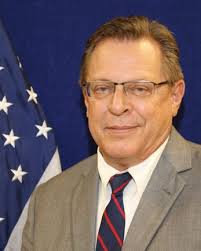The United States Consul General, Mr. John Bray, today advised the Nigerian government to enhance the modernisation of the nation’s agricultural sector as a strategic step towards meeting the needs of population growth and sustainable development.
The envoy gave the advice at the African Food and Products Exhibition and Conference (AFPE) with the theme ‘Non-Oil Exports: Scaling Up Productivity to Meet Global Demand’ organised by the Nigerian-American Chamber of Commerce (NACC) in Lagos.
Bray, who was represented by Jude Akhidenor, Regional Agricultural Counselor in the Embassy, pointed out that opportunities abound in all the 36 states in the country to create more businesses in the agricultural sector as well as provide jobs for millions of unemployed populace, particularly the youths.
He said: “While there has been increased human development in Nigeria over the past several years, huge inequalities still persist between men and women in the country.
“In many areas, particularly the agricultural sector, low productivity and lack of investment as well as limited or absence of infrastructure hold back economic development”, Bray added.
Substantiating his views with a 2015 African Development Bank (AfDB) report figures, the envoy projected that in the next 15 years, more than 370 million youths, including those in Nigeria, would enter Africa’s labour market.
According to him, there is the need for private enterprises working closely with government institutions at all levels to create more jobs in order to enable the various economies cope with the projected labour population.
“The population growth combined with climate change will exert increasing pressure on natural resources such as food, water and land”, Bray said.
He noted that developing and modernising the agricultural sector should be a priority for the Nigerian government, private sectors and other stakeholders “because food is a necessity- everyone must eat; moreover, food production, including processing and adding value is a good job and income generating enterprise,” he said.
In her remarks at the forum, , the Minister of State for Industry, Trade and Investment, Hajia Aisha Abubakar, who was represented by the Executive Director, Bank of Industry (BoI), Mr. Waheed Olagunju, said that the government was not oblivious of the potential of agriculture and its benefits for the nation’s economy.
She pointed out that that was why agriculture is one of six sectors identified for growth in the Economic Recovery & Growth Plan (ERGP).
The minister said: “For us as a nation, agriculture should not be treated as just a social sector intervention for managing poverty but more as a business for creating wealth and empowering citizens.
“It is the kind of business that can help many African nations, including Nigeria, diversify revenue, reduce import dependency, create jobs and develop rural areas”, Abubakar stressed.
She restated the present government’s determination to embark on agricultural industrialisation and implement innovative financing models that cater for the needs of both low-income farmers and high-income processors to drive economic diversity and productivity in the agricultural sector.
The minister noted that analysis by economists indicated that if Nigeria had maintained her export growth rate from the 1960s, the agriculture exports would have been valued at N2 trillion (about $6.6 billion) by now.
She explained that with the country’s agricultural export valued at just over N170 billion ($470 million) last year, it was just producing for export at less than 9 per cent of its potential.
Abubakar said: “I am very keen about our agriculture export potential as we have the opportunity to be the leading exporter of rice, maize, corn, shrimps and cocoa which we have in abundant quantities.
“Coincidentally, these are some of the most valuable agricultural products traded globally. It is clear that we have these agricultural resources and we need to work towards improving the quality and standards of our products not just to match up to global standards but to surpass them,” she said.




